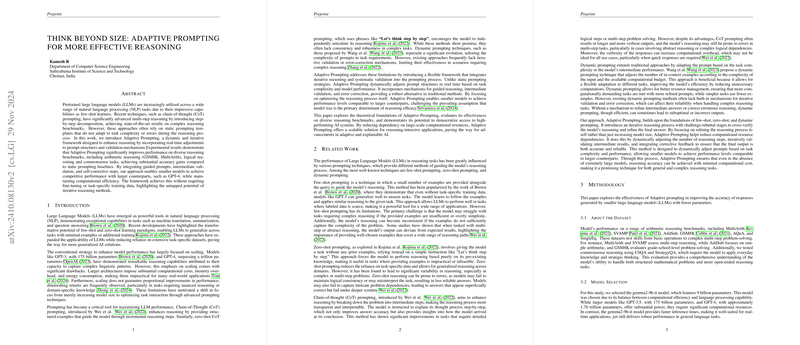Adaptive Prompting for Improved Reasoning in LLMs
The paper "Think Beyond Size: Adaptive Prompting for More Effective Reasoning" introduces a novel approach called Adaptive Prompting, aimed at enhancing the reasoning abilities of LLMs beyond mere increases in model size. This approach is particularly relevant given the substantial energy and computational costs associated with scaling up models such as GPT-3 and GPT-4, which demonstrate high capabilities but come with significant drawbacks, including diminishing returns on complexity and nuanced tasks.
Key Contributions and Methodology
Adaptive Prompting is presented as a flexible and iterative framework that dynamically adjusts prompting templates based on the complexity of the task and model performance. Unlike static strategies previously explored, such as few-shot prompting or chain-of-thought (CoT) prompting, this approach emphasizes real-time adaptation, guided reasoning, and intermediate validation to refine the model’s output iteratively. By doing so, Adaptive Prompting allows smaller models, which are computationally efficient, to perform on par with larger counterparts, effectively democratizing access to high-performing AI systems.
The methodology involves a multistage reasoning process, where the model begins with a comprehensive understanding of the task, breaks it down into manageable parts, and iteratively evaluates and refines its reasoning. For example, solving a complex arithmetic word problem, the model methodically decomposes the question, performs calculations, and confirms logical consistency at each step, adjusting for realism when necessary. This process ensures robustness and prevents error propagation, a common issue with traditional CoT prompting methods.
Experimental Results
Evaluations were carried out using diverse reasoning benchmarks, including datasets like GSM8K, MultiArith, and logic and commonsense tasks (e.g., CSQA, StrategyQA). The results underline the potential of Adaptive Prompting to enhance performance significantly. For instance, with Adaptive Prompting, a model with 9 billion parameters (Gemma2-9B) achieved an impressive accuracy of 99.44% on the MultiArith dataset. It also surpassed zero-shot CoT prompting in other arithmetic and reasoning benchmarks by substantial margins.
The findings demonstrate that Adaptive Prompting not only improves performance on complex reasoning tasks but also does so without the need for additional fine-tuning or task-specific training data. Importantly, these results challenge the prevailing assumption that increasing model size is the most effective way to enhance reasoning capabilities in LLMs.
Implications and Future Directions
Adaptive Prompting opens new avenues for the development of intelligent systems able to perform sophisticated reasoning with fewer resources. This is particularly relevant for domains requiring nuanced understanding, such as secure systems, real-time applications, and environments with constrained computational resources. The reduced dependency on massive models means that deployment becomes more accessible and manageable.
The framework's propensity for error detection and correction suggests potential applications in areas requiring high reliability, such as automated decision-making and critical infrastructure systems. Moreover, implications for adversarial prompt neutralization show promise in AI safety, positioning Adaptive Prompting as a tool for enhancing model robustness against intentional misguidance.
Future research should aim at expanding the scope of adaptive frameworks beyond arithmetic and commonsense reasoning to include areas such as legal reasoning and scientific discovery. The challenges posed by inherent biases and ethical considerations also warrant further investigation could potentially include integrating safeguards for bias detection and management within the iterative framework.
In conclusion, Adaptive Prompting underscores the significance of adaptive task interaction strategies in optimally utilizing model capabilities, providing a viable alternative to merely escalating model size. This approach is poised to contribute substantially to advancing AI's adaptability and reasoning capacity in practical and efficient ways.
